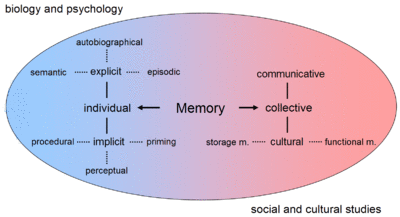Themes in Dancing at Lughnasa
(Photo of a chart displaying memory beyond the individual from Wanton Creation on Word Press.com by The Other Watson)
Memory is a huge theme in Dancing at Lughnasa, and other works by Friel as well. Friel really delves into personal memories of Michael, not to necesssaily provide fact about actual events through memory, but to capture the atmosphere of Michael's memory. "Thus, for Friel, memory is ‘simultaneously actual and illusory,’ because it is true to the emotional content of the memory without necessarily being true to the actual events that took place" (McGrath). Nostalgic memories of Michael are triggered through music of the thirties heard from the family's new wireless set (McGrath).
Friel's play is also centered around a theme of change. The introduction of the new wireless set into the Mundy house brings about a turning point in the family, as well as in rural Irish cultural history.The new radio in 1936 was an exciting technology that brought mass produced popular culture and music into the home. Many households in Donegal had not yet acquired a radio. This new variety of music into the Mundy home unleashes animalistic urges amongst the five sisters who live there. This new radio also represents more significant economic changes in the Industrial Revolution. We see this in the play in other ways too, such as with Rose and Agnes, who are no longer able to support themselves at home knitting, because the new knitting factories have replaced the cottage industry at that time. Kate, one of the sisters, and the oldest, even expresses in the play that she feels a change in the air. She says,
"You work hard at your job. You try to keep the home together. You perform your duties as best you can— because you believe in responsibilities and obligations and good order. And then suddenly, suddenly you realize that hair cracks are appearing everywhere; that control is slipping away; that the whole thing is so fragile it can't be held together much longer. It's all about to collapse." (McGrath)
The theme of pagan ritual through song, dance, and sacrifice is another central theme in Dancing at Lughnasa. The festival of Lughnasa, during which the play takes place, is a pagan harvest ritual of which the eldest sister Kate is the most digusted. Friel also presents dancing, singing, and music throughout the action of the play as a reference to pagan ritual. Upon his return from Uganda, Father Jack describes experiences with pagan-like rituals, including sacrifices of wildlife and intense native dances. Rose mentions the "sweeney boy," who gets severely burned during some kind of ritual by fire in the back hills. Kate is appalled by this all, and she even makes a connection to the new music brought into the household with the new introduction of these pagan ideas. When referring to the wireless set, she exclaims, “D'you know what that thing has done? Killed all Christian conversation in this country.’’ Along with this, each new revelation about pagan-like rituals from Uganda by Father Jack further disturb Kate. But Kate eventually comes to a peaceful conclusion about Father Jack when she states that he’s simply going through 'his own distinctive spiritual search.' In this play, Friel appears to be celebrating the spiritual search of the characters through pagan song, dance, and ritual (McGrath)



